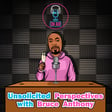
Healing Divides: Dr. Matt Salmon on Love, Family, & LGBTQ+ Advocacy
In this compelling episode of Unsolicited Perspectives, host Bruce Anthony interviews Dr. Matt Salmon, a psychiatrist, LGBTQ+ advocate, and author of Pride and Prejudice: Healing Division in a Modern Family. Dr. Salmon shares his deeply personal journey of growing up gay and autistic in a conservative Mormon family, where his father served as a Republican congressman.
From surviving the trauma of conversion therapy to embracing his queer identity, Dr. Salmon’s story is one of resilience, self-acceptance, and advocacy. This episode delves into the psychological toll of conversion therapy, the challenges of navigating family dynamics, and how he transformed his experiences into a mission to support LGBTQ+ youth and their families.
Discover actionable insights on creating safe spaces, fostering acceptance, and bridging divides within families. Whether you're a parent, mental health professional, LGBTQ+ ally, or someone seeking inspiration on personal growth, this conversation offers valuable lessons on empathy, love, and healing.
Tune in to be inspired by Dr. Salmon’s journey and mission to create a more inclusive and loving world! ❤️✨ #LGBTQAdvocacy #mentalhealthawareness #HealingFamilies #loveandacceptance #unsolicitedperspectives
🔔 Hit that subscribe and notification button for weekly content that bridges the past to the future with passion and perspective. Thumbs up if we’re hitting the right notes! Let’s get the conversation rolling—drop a comment and let’s chat about today’s topics.
For the real deal, uncensored and all, swing by our Patreon at patreon.com/unsolicitedperspectives for exclusive episodes and more.
Thank you for tuning into Unsolicited Perspectives with Bruce Anthony. Let's continue the conversation in the comments and remember, stay engaged, stay informed, and always keep an open mind. See you in the next episode!
Chapters:
00:00 Welcome to Unsolicited Perspectives 🎙️🔥💥
00:35 Meet Dr. Matt Salmon 🌈📚
01:58 Born Under the Spotlight: Early Life and Challenges 🏠⛪
04:05 Navigating Identity in a Restrictive World 💭🤔
09:37 Coming Out: Courage, Conflict, and Family Dynamics ❤️🩹🏳️🌈
25:12 Conversion Therapy: A Dark Chapter ⚡🛑
32:23 The Psychological Toll of Conversion Therapy 🧠💔
34:48 Finding Freedom: College and Self-Acceptance 🎓🌟
38:45 Political Activism: Fighting from the Inside 🗳️✊
40:56 The Road to Psychiatry 🩺✨
41:57 Family Growth: Bridging Divides 🫂💞
47:26 Writing the Book: Pride and Prejudice ✍️📖
48:30 Caring for LGBTQ+ Youth: Holistic Healing 🌱🏳️⚧️
58:19 Parting Words: Love as the Ultimate Answer ❤️🌟
Follow the Audio Podcast:
Apple Podcast: https://podcasts.apple.com/us/podcast/unsolicited-perspectives/id1653664166?mt=2&ls=1
Spotify: https://open.spotify.com/show/32BCYx7YltZYsW9gTe9dtd
www.unsolictedperspectives.com
Beat Provided By https://freebeats.io
Produced By White Hot
